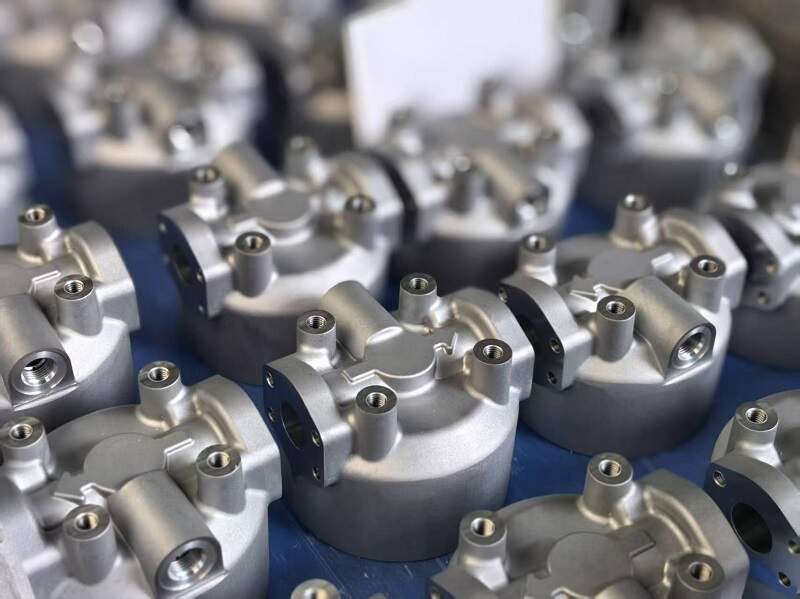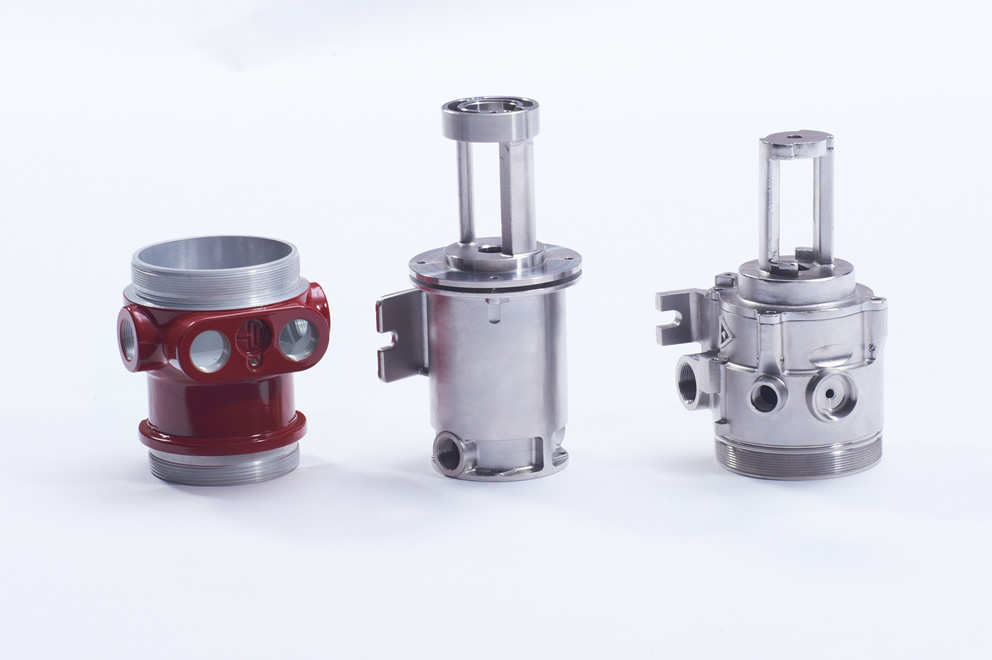Precision aluminum casting applications across industrial sectors
Wiki Article
The Effect of Innovative Factory Services on Lasting Manufacturing Practices
Cutting-edge factory solutions play a crucial function beforehand lasting manufacturing methods. By integrating reusing technologies and energy-efficient procedures, these services significantly reduce ecological impact. Factories can reclaim useful materials, consequently decreasing dependence on virgin resources. As automation and lean production principles gain traction, production performance is maximized. Nevertheless, the full degree of these advancements and their ramifications for the future of making remain to be checked out.The Duty of Advanced Recycling Technologies in Foundries
Advanced recycling innovations are changing the landscape of shops by enhancing material healing and lowering waste. These innovative processes allow factories to redeem beneficial metals and materials from scrap, reducing reliance on virgin sources. By incorporating innovative sorting, shredding, and melting techniques, foundries can efficiently extract usable materials from disposed of products, thus advertising a round economic situation.Furthermore, these technologies support the production of premium alloys and elements, making sure that recycled products meet strict market standards (Precision aluminum casting). As a result, factories are not only improving their product performance however also lowering the ecological effect related to conventional manufacturing approaches
This change towards advanced reusing not only bolsters economic viability for shops however likewise aligns with international sustainability objectives. Eventually, the incorporation of these technologies stands for a significant advance in the quest for lasting manufacturing methods within the foundry market.
Energy Performance: Decreasing Intake in Manufacturing Processes
Power efficiency in making processes is essential for sustainable procedures. Strategies such as procedure optimization techniques, sustainable energy combination, and waste warmth recovery play crucial roles in lessening power consumption. By concentrating on these locations, manufacturers can substantially reduce their environmental influence while boosting productivity.Process Optimization Techniques
A substantial variety of manufacturing facilities are significantly adopting process optimization methods to boost power efficiency and decrease intake. These strategies involve evaluating and fine-tuning production workflows, determining traffic jams, and applying automation to simplify procedures. By leveraging data analytics, manufacturers can keep track of power use in real-time, making it possible for aggressive adjustments to reduce waste. Methods such as Lean Manufacturing and 6 Sigma concentrate on getting rid of inadequacies and maximizing source appropriation. In addition, advanced modern technologies like Net of Points (IoT) sensing units supply insights right into tools efficiency, facilitating anticipating upkeep that stops energy loss. Overall, these procedure optimization approaches not only add to reduced power usage but also cultivate a culture of continuous renovation within making atmospheres, aligning functional methods with sustainability goals.Renewable Power Combination
Many production facilities are increasingly incorporating renewable resource sources to boost general energy performance and decrease dependence on conventional power grids. This change consists of the adoption of solar, wind, and biomass power, which can significantly decrease operational prices and reduce carbon footprints. By using these lasting energy resources, manufacturers not just reduce their ecological impact however additionally enhance power resilience. On top of that, incorporating sustainable power systems typically entails advanced innovations such as power storage and wise grid remedies, which optimize energy usage and promote real-time monitoring. This combination sustains makers in attaining regulatory compliance and conference sustainability objectives while fostering development in manufacturing processes. Inevitably, renewable resource combination stands for a crucial change towards more sustainable manufacturing methods and long-lasting feasibility.Waste Warm Recuperation
Incorporating renewable resource resources establishes the phase for more innovations in power performance, specifically via the execution of waste warmth recuperation systems. These systems record excess thermal power produced during producing processes, which would otherwise be shed to the setting. By repurposing this warmth, shops can significantly minimize their energy consumption, reduced functional expenses, and reduce their carbon footprint. The recovered warmth can be made use of for different applications, such as heating, power generation, or preheating raw products. Because of this, waste heat recovery not just improves energy performance yet likewise adds to a lasting manufacturing model. Cutting-edge factory services that prioritize this technology are leading the method for an environmentally responsible commercial landscape, lining up success with ecological stewardship.Making Use Of Eco-Friendly Materials in Shop Workflow
As the need for lasting manufacturing techniques grows, shops are progressively turning to eco-friendly products to enhance their procedures. By integrating lasting options, such as bio-based binders and recycled steels, foundries can significantly reduce their ecological footprint. These products frequently call for much less energy for handling and can minimize unsafe emissions throughout production.In addition, the adoption of environment-friendly materials not only straightens with regulatory requirements yet also satisfies customer choices for greener products. Foundries are checking out cutting-edge alternatives, such as using organic additives that enhance mold and mildew quality while staying safe.
The change to lasting materials fosters a circular economic situation by promoting resource reuse and lessening waste. In addition, this change can improve the general effectiveness of factory procedures, as green products often exhibit exceptional residential or commercial properties, resulting in enhanced item efficiency - Precision aluminum casting. Ultimately, the utilization of environmentally friendly materials represents an essential step toward lasting production in the factory market

Technologies in Waste Administration and Reduction Techniques
The shift in the direction of eco-friendly products in foundry procedures leads the way for improvements in waste monitoring and reduction methods. Cutting-edge foundry solutions are significantly taking on strategies that lessen waste generation and advertise recycling. Techniques such as closed-loop systems permit the reuse of products, greatly minimizing the quantity of waste generated throughout making procedures. Additionally, developments in filtering and splitting up modern technologies make it possible for the efficient recovery of important spin-offs, which can be rehabilitated into the production cycle.The execution of real-time tracking systems supplies data-driven insights into waste generation patterns, facilitating informed decision-making to maximize source use. Factories are also exploring biowaste solutions, transforming natural waste right into energy or usable materials, even more promoting sustainability. These advancements not just add to a circular economy but additionally boost the total environmental performance of foundry procedures, emphasizing the market's commitment to decreasing its ecological impact.
The Effect of Automation on Sustainable Production
While many industries aim for sustainability, automation arises as an essential variable in improving lasting production practices within foundries. By incorporating automated systems, factories can achieve better performance, reduce waste, and lower energy intake. Automated processes permit accurate control over manufacturing specifications, reducing issues Precision aluminum casting and remodel, which in turn preserves resources.In addition, automation assists in the monitoring of ecological influences, allowing real-time changes that align with sustainability objectives. aluminum casting. Advanced robotics and expert system can enhance product use, bring about significant reductions in scrap and discharges
Furthermore, automated modern technologies promote safer workplace by taking care of hazardous tasks, thereby enhancing worker wellness while making sure conformity with ecological laws. Overall, the adoption of automation within foundries not only improves procedures yet additionally plays a pivotal role ahead of time sustainable manufacturing practices, contributing to a much more accountable industrial landscape.
Instance Researches: Effective Execution of Lasting Factory Practices
Effective application of sustainable practices in foundries can be illustrated through various study that highlight measurable outcomes and innovative strategies. One remarkable instance is a mid-sized shop that took on a closed-loop water reusing system, minimizing water usage by 40% and decreasing wastewater generation. Additionally, this facility changed to using environmentally friendly mold products, which not just improved product top quality yet also enhanced employee security.Another substantial instance included a big foundry incorporating sustainable energy sources, such as photovoltaic panels, which balance out 30% of its energy needs. This campaign not only reduced operational prices however additionally added to a substantial decrease in carbon emissions.
Finally, a foundry that carried out lean production techniques reported a 25% rise in efficiency, bring about less material waste and maximized manufacturing processes. These situations jointly underscore the concrete advantages and sustainability developments attainable via cutting-edge foundry methods.
Often Asked Inquiries
How Do Innovative Foundry Services Add To Overall Sustainability Objectives?
Cutting-edge foundry services enhance overall sustainability goals by optimizing resource usage, reducing waste, and improving energy performance. These advancements add to decrease carbon impacts and advertise eco liable techniques within the production sector, sustaining more comprehensive sustainability campaigns.What Are the Economic Benefits of Adopting Sustainable Foundry Practices?
Embracing lasting factory methods can minimize operational expenses, enhance resource efficiency, and enhance competition. In addition, these techniques can draw in eco-conscious customers and capitalists, eventually leading to raised productivity and long-lasting economic viability for organizations.Exactly How Can Little Shops Carry Out Sustainable Developments Properly?
Little foundries can apply sustainable technologies properly by embracing energy-efficient technologies, enhancing source use, training team on sustainable methods, teaming up with providers for eco-friendly materials, and participating in continual renovation procedures to minimize waste and exhausts.What Certifications Exist for Lasting Shop Operations?

Exactly How Do Consumer Preferences Impact Sustainable Production in Foundries?
Consumer choices considerably affect sustainable production in factories by driving need for environment-friendly products. As customers prioritize sustainability, factories adapt their methods, incorporating greener modern technologies and materials to satisfy market expectations and improve their affordable advantage.By repurposing this warmth, foundries can substantially reduce their power consumption, reduced functional expenses, and lessen their carbon impact. Foundries are likewise exploring biowaste services, transforming organic waste into power or useful materials, additionally advertising sustainability. By integrating automated systems, shops can achieve higher performance, reduce waste, and lower power intake. One more substantial case included a huge foundry incorporating eco-friendly energy resources, such as solar panels, which counter 30% of its energy needs. Ingenious factory solutions boost overall sustainability goals by enhancing resource use, reducing waste, and enhancing power performance.
Report this wiki page